|
|
|
Sort Order |
|
|
|
Items / Page
|
|
|
|
|
|
|
| Srl | Item |
| 1 |
ID:
117990
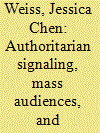

|
|
|
|
|
| Publication |
2013.
|
| Summary/Abstract |
How can authoritarian states credibly signal their intentions in international crises? Nationalist, antiforeign protests are one mechanism by which authoritarian leaders can visibly demonstrate their domestic vulnerability. Because protests in authoritarian states are risky and costly to repress, the decision to allow or stifle popular mobilization is informative. The threat of instability demonstrates resolve, and the cost of concession increases the credibility of a tough stance. The danger of instability and escalation increases foreign incentives to make concessions and preserve the status quo. This logic helps explain the pattern of authoritarian tolerance and repression toward nationalist protest. A case study of two U.S.-China crises shows how China's management of anti-American protests affected U.S. beliefs about Chinese resolve.
|
|
|
|
|
|
|
|
|
|
|
|
|
|
|
|
| 2 |
ID:
117997
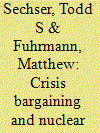

|
|
|
|
|
| Publication |
2013.
|
| Summary/Abstract |
Do nuclear weapons offer coercive advantages in international crisis bargaining? Almost seventy years into the nuclear age, we still lack a complete answer to this question. While scholars have devoted significant attention to questions about nuclear deterrence, we know comparatively little about whether nuclear weapons can help compel states to change their behavior. This study argues that, despite their extraordinary power, nuclear weapons are uniquely poor instruments of compellence. Compellent threats are more likely to be effective under two conditions: first, if a challenger can credibly threaten to seize the item in dispute; and second, if enacting the threat would entail few costs to the challenger. Nuclear weapons, however, meet neither of these conditions. They are neither useful tools of conquest nor low-cost tools of punishment. Using a new dataset of more than 200 militarized compellent threats from 1918 to 2001, we find strong support for our theory: compellent threats from nuclear states are no more likely to succeed, even after accounting for possible selection effects in the data. While nuclear weapons may carry coercive weight as instruments of deterrence, it appears that these effects do not extend to compellence.
|
|
|
|
|
|
|
|
|
|
|
|
|
|
|
|
| 3 |
ID:
117994
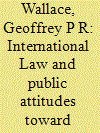

|
|
|
|
|
| Publication |
2013.
|
| Summary/Abstract |
Domestic approaches to compliance with international commitments often presume that international law has a distinct effect on the beliefs and preferences of national publics. Studies attempting to estimate the consequences of international law unfortunately face a wide range of empirical and methodological challenges. This article uses an experimental design embedded in two U.S. national surveys to offer direct systematic evidence of international law's effect on mass attitudes. To provide a relatively tough test for international law, the surveys examine public attitudes toward the use of torture, an issue in which national security concerns are often considered paramount. Contrary to the common contention of international law's inefficacy, I find that legal commitments have a discernible impact on public support for the use of torture. The effect of international law is also strongest in those contexts where pressures to resort to torture are at their highest. However, the effects of different dimensions in the level of international agreements' legalization are far from uniform. In contrast to the attention often devoted to binding rules, I find that the level of obligation seems to make little difference on public attitudes toward torture. Rather, the relative precision of the rules, along with the degree to which enforcement is delegated to third parties, plays a much greater role in shaping public preferences. Across both international law and legalization, an individual's political ideology also exerts a strong mediating effect, though in varying directions depending on the design of the agreement. The findings have implications for understanding the overall impact of international law on domestic actors, the importance of institutional design, and the role of political ideology on compliance with international agreements.
|
|
|
|
|
|
|
|
|
|
|
|
|
|
|
|
| 4 |
ID:
117992
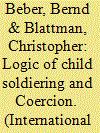

|
|
|
|
|
| Publication |
2013.
|
| Summary/Abstract |
Why do armed groups recruit large numbers of children as fighters, often coercively? The international community has tried to curb these crimes by shaming and punishing leaders who commit them-in short, making the crimes costlier. Are these policies effective and sufficient? The answer lies in more attention to the strategic interaction between rebel leaders and recruits. We adapt theories of industrial organization to rebellious groups and show how, being less able fighters, children are attractive recruits if and only if they are easier to intimidate, indoctrinate, and misinform than adults. This ease of manipulation interacts with the costliness of war crimes to influence rebel leaders' incentives to coerce children into war. We use a case study and a novel survey of former child recruits in Uganda to illustrate this argument and provide hard evidence not only that children are more easily manipulated in war, but also how-something often asserted but never demonstrated. Our theory, as well as a new "cross-rebel" data set, also support the idea that costliness matters: foreign governments, international organizations, diasporas, and local populations can discourage child recruitment by withholding resources or punishing offenders (or, conversely, encourage these crimes by failing to act). But punishing war crimes has limitations, and can only take us so far. Children's reintegration opportunities must be at least as great as adults' (something that demobilization programs sometimes fail to do). Also, indoctrination and misinformation can be directly influenced. We observe grassroots innovations in Uganda that could be models for the prevention and curbing of child soldiering and counterinsurgency generally.
|
|
|
|
|
|
|
|
|
|
|
|
|
|
|
|
| 5 |
ID:
117996
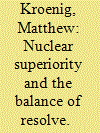

|
|
|
|
|
| Publication |
2013.
|
| Summary/Abstract |
Scholars have long debated whether nuclear superiority or the balance of resolve shapes the probability of victory in nuclear crises, but they have not clearly articulated a mechanism linking superiority to victory, nor have they systematically analyzed the entire universe of empirical cases. Beginning from a nuclear brinkmanship theory framework, I develop a new theory of nuclear crisis outcomes, which links nuclear superiority to victory in nuclear crises precisely through its effect on the balance of resolve. Using a new data set on fifty-two nuclear crisis dyads, I show that states that enjoy nuclear superiority over their opponents are more likely to win nuclear crises. I also find some support for the idea that political stakes shape crisis outcomes. These findings hold even after controlling for conventional military capabilities and for selection into nuclear crises. This article presents a new theoretical explanation, and the first comprehensive empirical examination, of nuclear crisis outcomes.
|
|
|
|
|
|
|
|
|
|
|
|
|
|
|
|
| 6 |
ID:
117998
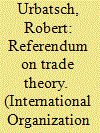

|
|
|
|
|
| Publication |
2013.
|
| Summary/Abstract |
Research on mass opinion in international political economy overwhelmingly relies on survey data. This poses problems of external validity, especially for a frequently low-salience issue such as trade policy. To examine whether survey findings about attitudes toward economic openness apply outside of surveys, this note considers patterns of voting in the 2007 Costa Rican plebiscite about joining the Central American Free Trade Area. Several extant theories appear to explain voting patterns, but the results are less in line with traditional economic models based on locally important economic sectors.
|
|
|
|
|
|
|
|
|
|
|
|
|
|
|
|
| 7 |
ID:
117991


|
|
|
|
|
| Publication |
2013.
|
| Summary/Abstract |
Discussions of weapons taboos have failed to take into account the possibility that prescriptive international and national norms of behavior may come into conflict. Using psychological studies of trade-offs and protected values as a guide, this article argues that when these conflicts exist, the taboos' individual-level constraining effects can be vitiated. An analysis of General George Marshall's proposal to use chemical weapons against the Japanese in 1945 demonstrates that normative conflict can produce a readiness to violate weapons taboos. In these situations, state decisions to violate taboos may depend on the extent to which the perception of normative conflict is shared by other decision makers and society more generally.
|
|
|
|
|
|
|
|
|
|
|
|
|
|
|
|
|
|
|
|
|